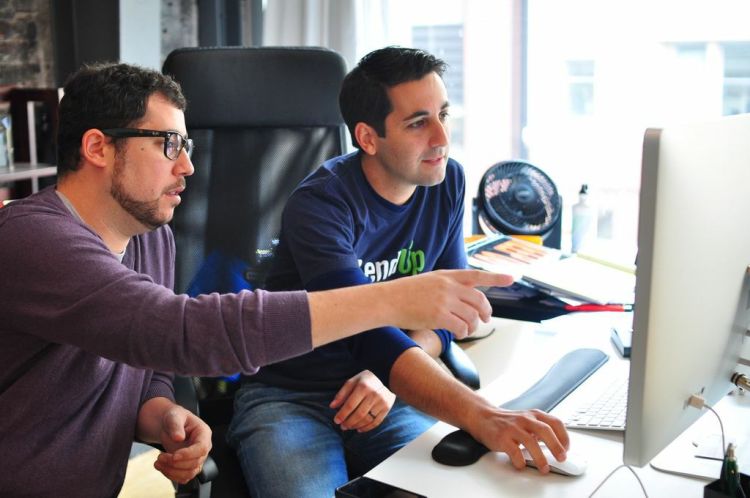LendUp, a startup with an alternative to payday loans, has just raised $14 million in its first round of venture funding.
We first reported on LendUp in October 2012, when the San Francisco-based company launched its website and mobile app for California residents. The company has subsequently given out tens of thousands of loans and millions of dollars to people with poor credit, and plans to expand its service across the country.
LendUp uses sophisticated algorithmic technology to pinpoint the subset of about 15 percent of people who are most likely to repay a loan. The company offers these customers up to $1,000 per year with interest rates as low as 29 percent APR, with no rollover fees or hidden charges.
The goal is to provide loans to people who banks typically decline, so they can avoid sinking into mountains of debt.
To determine loan eligibility, LendUp pulls publicly available data from a variety of sources, including social media sites like Facebook and LinkedIn. LendUp’s algorithm also considers an applicants’ credit history, and demographic data.
The ideal borrower, according to chief executive Sasha Orloff, is a single mother, who has to “wait on a street corner behind bullet proof glass” to take out a short-term loan to buy groceries for her family.
Another advantage for LendUp customers is that loan decisions are instantaneous, and anyone can apply at anytime of day or night. “Not even Zest or Think or BillFloat do full algorithmic underwriting 100 percent of the time,” said Orloff in an interview.
Unlike corrupt payday loans, LendUp’s model is designed to be uplifting, rather than dragging people down. When loans are repaid, applicants automatically move up the ladder. These repeat customers can unlock benefits, namely a higher-quality loan at a lower interest rate. LendUp now offers four levels or “rungs”: silver, gold, platinum and prime.
“We are the only lender who automatically gives our borrowers lower rates, over time, for demonstrating responsible behavior,” said Orloff.
LendUp’s founders would consider themselves social entrepreneurs, meaning they use business processes to drive social or environmental impact. Many of the startup’s early investors, including Kapor Capital and Bronze Investments, are focused on funding these types of “technology for good” companies. Similar mission driven startups in the financial technology sector are SoFi, a affordable lender for students and LendDo, which helps people with poor credit engage their social network to establish credibility.
The founding team are graduates of Y Combinator, an elite Silicon Valley accelerator. Orloff started the company with his stepbrother Jacob Rosenberg, and hired analytics lead Kai Stinchcombe (who subsequently left to start another financial startup focused on underserved populations, True Link Financial).
The company plans to hire talent, grow into new markets, and invest in marketing to get the word out. In order to expand nationally, the team will also need to set aside funding to deal with any potential regulatory challenges.
Orloff admits that it won’t be easy to overcome some of the heat from illegal payday lenders, and convince potential customers that their offering is not corrupt. Many of the current lenders don’t follow U.S. laws, and incorporate on Native American tribal grounds or overseas.
“They operate online lending websites that have fine print, hidden fees, charge rates above state usary laws, don’t follow federal laws on collections or marketing,” said Orloff. These lenders have also been known to intimidate and threaten people to turn a profit.
However, Orloff believes that the LendUp model is already working, and we’ll soon see copycats all over the world.
“We have found a solution that does not cut off capital to poor people, and helps them in the long run by offering them cheaper rates, helping them build credit, and embedding financial education into the experience,” he said.
LendUp’s Series A round was led by Google Ventures, with participation from Data Collective and QED Investors. QED’s managing partner Nigel Morris is the founder of Capital One, which is one of the most successful subprime consumer lenders in the country.
Want to learn more about LendUp? Here’s Orloff delivering a TEDx talk about how the startup is disrupting payday loans, and overcoming bias. “I’m proud to be a payday lender,” he says.
VentureBeat's mission is to be a digital town square for technical decision-makers to gain knowledge about transformative enterprise technology and transact. Learn More

